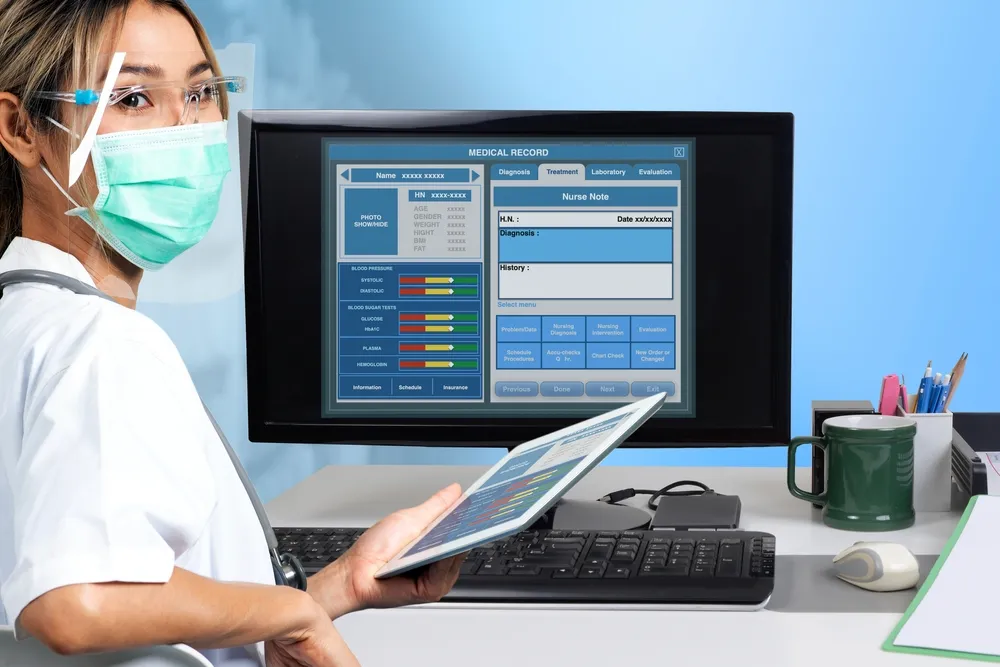PLANO, TX — February 2026 — PracticeEHR has earned recognition as a 2026 FrontRunner for Electronic Medical Records by Software Advice. The FrontRunners report identifies top-performing software products by evaluating...
The What Works Clearinghouse (WWC) serves as a vital resource for informing evidence-based practices across various fields, including healthcare. Its significance lies in its rigorous research methodology, which involves a comprehensive analysis of existing literature, conducting meta-analyses, and assessing study designs.
In healthcare, particularly in choosing Electronic Health Record (EHR) software like Practice EHR, the WWC's comparative analyses, user reviews and feedback, and commitment to continuous updates provide valuable insights. By aligning with the principles advocated by the WWC, healthcare professionals can make informed decisions, ensuring that their practices remain at the forefront of evidence-based decision-making, ultimately benefiting their patients with the best possible care.
In this blog post, we'll explore the significance of the What Works Clearinghouse and how it can inform evidence-based practices, particularly in Electronic Health Record (EHR) software, focusing on Practice EHR.

Understanding the What Works Clearinghouse (WWC)
The What Works Clearinghouse (WWC) initiative was established by the Institute of Education Sciences (IES) in the United States. Its primary goal is to identify and promote evidence-based research and practices in education. The WWC provides educators, policymakers, and other stakeholders with a central and trusted source of information on the effectiveness of various educational interventions, programs, and policies.
The WWC uses a rigorous and transparent methodology to review and synthesize the available research on a topic. Its reviews are conducted by teams of researchers, statisticians, and subject-matter experts who follow a standardized set of procedures and criteria. This approach ensures that its reviews are impartial, reliable, and valuable to practitioners and decision-makers.
Although the WWC focuses on education, its methodology and approach are applicable to other fields, including healthcare. The WWC's emphasis on evidence-based research and transparent review processes can help healthcare professionals make informed decisions about the effectiveness of various treatments and interventions. Overall, the What Works Clearinghouse is a valuable resource for anyone seeking reliable and trustworthy information on what works in education and beyond.

The Importance of Evidence-Based Practices in Healthcare
Evidence-based practices are a crucial aspect of modern healthcare. As medical science has advanced, healthcare professionals have recognized the need to depend on the most dependable and efficient methodologies to achieve optimal results for their patients.
By implementing evidence-based practices, healthcare providers can be confident that they are delivering care that is backed by strong scientific evidence. This means that patients are more likely to receive the most effective and safest treatment options available.
Healthcare professionals who want to stay informed with the most recent evidence-based practices can rely on the What Works Clearinghouse (WWC) as a valuable resource. The WWC provides guidance and recommendations based on the most current research, helping professionals navigate the sea of information available to them.
Ultimately, by implementing evidence-based practices and relying on trusted sources of information such as the WWC, healthcare professionals can provide their patients the highest quality of care.
Electronic Health Record (EHR) Software: A Game-Changer in Healthcare
Electronic Health Record (EHR) software has been instrumental in modernizing the healthcare industry. With the help of EHR systems like Practice EHR, a practice can automate time-consuming tasks, ensuring healthcare providers can focus on dedicating more time to patients delivering quality care to patients. These systems have revolutionized managing patient data, resulting in greater efficiency and effectiveness in the healthcare industry.
However, choosing the right EHR software for a healthcare practice can be challenging. There are many factors to consider, such as user-friendliness, compatibility with existing systems, and security features. It is essential to conduct thorough research and analysis before selecting an EHR system.
In short, while EHR software has revolutionized the healthcare industry, choosing the right system for a healthcare practice is essential. By considering factors such as user-friendliness, interoperability, and security, healthcare providers can select an EHR system that meets the specific needs of a practice and improves the quality of care provided to patients.
How the "What Works Clearinghouse" Compliments EHR Software Choices
1. Thorough Research Methodology
The WWC employs rigorous research methodologies to evaluate interventions and programs. By analyzing the available literature, conducting meta-analyses, and assessing study designs, the WWC provides comprehensive insights into the effectiveness of various interventions, including EHR software.
2. Comparative Analysis
The WWC conducts comparative analyses of different interventions within a specific field. Healthcare professionals can benefit from these comparisons when choosing EHR software. By evaluating the relative effectiveness of various systems, professionals can make informed decisions tailored to their specific needs.
3. User Reviews and Feedback
Beyond the research data, the WWC also collects user reviews and feedback. This real-world input from healthcare providers implementing specific EHR software solutions offers valuable perspectives. Understanding the user experience is vital in making decisions that affect day-to-day operations.
4. Continuous Updates
Healthcare technology is constantly evolving. What works today might be a better choice than tomorrow. The WWC addresses this challenge by providing continuous updates and reviews. The WWC offers a dependable resource for professionals to stay up-to-date with the latest developments and shifts in EHR software. This ensures that their practices remain at the forefront of healthcare technology.
Practice EHR and the What Works Clearinghouse
Let's delve deeper into how Practice EHR, a leading EHR software provider, aligns with the principles advocated by the What Works Clearinghouse. Practice EHR, a system designed with the needs of healthcare providers in mind, has garnered significant attention within the medical community.
Thorough Research Integration
Practice EHR's development is rooted in extensive research. The creators collaborated with medical professionals and researchers, ensuring the software addresses genuine challenges healthcare providers face. The WWC's methodology aligns with this approach, emphasizing the importance of evidence-based decision-making.
Comparative Effectiveness
Practice EHR has undergone comparative effectiveness studies, pitting it against other EHR solutions. These studies, often reviewed by organizations like the WWC, highlight Practice EHR's user-friendly interface, comprehensive features, and seamless integration capabilities. Professionals seeking reliable EHR solutions can trust such comparative analyses when making decisions.
User Feedback Integration
Practice EHR actively collects feedback from its users. This feedback loop, akin to the WWC's reliance on user reviews, ensures that the software is continually refined based on real-world experiences. Positive user feedback often aligns with the recommendations made by the WWC, reinforcing the software's effectiveness.
Commitment to Innovation
Practice EHR's commitment to innovation mirrors the forward-thinking approach advocated by the WWC. Regular updates and enhancements, informed by the latest medical research and technological advancements, make Practice EHR a choice that aligns with evidence-based practices.
Conclusion: Empowering Evidence-Based Decision-Making
In the ever-changing healthcare technology landscape, the What Works Clearinghouse is one of the best things that happened to evidence-based practices. Its meticulous research, comparative analyses, user feedback integration, and commitment to continuous updates empower healthcare professionals to make informed decisions, particularly when choosing EHR software like Practice EHR.
By aligning with the principles upheld by the WWC, healthcare providers can embrace technology confidently, knowing that their choices are grounded in robust research and real-world user experiences. In this symbiotic relationship between reliable resources and innovative solutions, the ultimate beneficiaries are the patients, who receive the best care informed by evidence-based decision-making.
Incorporating the insights provided by the What Works Clearinghouse into the selection and implementation of EHR software ensures that healthcare professionals can focus on what matters most: delivering exceptional patient care in an increasingly digital world.
If you want to explore an EHR that features all advanced aspects including What Works Clearinghouse, reach us now for a FREE DEMO of PracticeEHR.
Topics: Patient Care, EHR Solution, digital age, Medical Billing, What Works Clearinghouse, Clearinghouse
RECENT POSTS



TOPICS
- EHR Solution (193)
- EHR (127)
- digital age (120)
- Patient Care (117)
- Medical Billing (112)
- Specialty-Specific EHR (112)
- Industry Update (98)
- Technology in Healthcare (84)
- EHR Features (79)
- Small Practice (78)
- Medical billing services (74)
- Integrated EHR (64)
- RCM (64)
- HIPAA Security (62)
- Cloud-based EHR (44)
- New Technology (44)
- Telemedicine (44)
- Healthcare Office Management (40)
- Practice EHR News (40)
- Kiosk (31)
- Revenue Cycle Management (28)
- AI Solutions (26)
- ePrescribing (21)
- AI Scribing (17)
- Best EHR Software (17)
- Practice Management Software (13)
- AI EHR (12)
- AI-powered Medical Billing (12)
- EMR (12)
- TeleVisit (12)
- AI Scribe (11)
- Practice Automation (11)
- Client Favorites (10)
- The ONE (10)
- AI scanning (9)
- Switching to New EHR (9)
- Urgent Care (9)
- Best EHR Practice (8)
- EHR Integration (8)
- MACRA/MIPS (8)
- Patient Portal (8)
- Psychiatry EHR (8)
- Medical Practice Management Software (7)
- Automated Health Tools (6)
- E-Prescribing (6)
- Product Updates (6)
- events (6)
- MIPS (5)
- Mobile EHR (5)
- Telehealth Platforms (5)
- Family Medicine EHR (4)
- HIPAA (4)
- Insider (4)
- Integrated Practice Management (4)
- Internal Medicine EHR (4)
- MIPS Reporting (4)
- Multilingual AI Scribe (4)
- Orthopedics EHR (4)
- Podiatry (4)
- Podiatry EHR (4)
- Regulatory Updates (4)
- Telehealth Platform (4)
- Automated EHR (3)
- Chiropractic EHR (3)
- Digital Experiences (3)
- EHR Flaws (3)
- EHR Implementation (3)
- EHR for Chiropractors (3)
- EHR for Small Practices (3)
- Eligibility Verification in Medical Billing (3)
- Medical Coding Services (3)
- Patient Check-in Kiosk (3)
- PracticeEHR GO App (3)
- AI Scan (2)
- Cash Flow (2)
- Cashless Payments (2)
- Clearinghouse (2)
- Dermatology EHR (2)
- EHR Scheduling (2)
- Family Medicine (2)
- Foot and Ankle Care (2)
- Foot and Ankle EHR (2)
- Health records 101 (2)
- Healthcare Compliance Certification (2)
- Medical Billing Partner (2)
- Medical Credentialing (2)
- Pediatrics EHR (2)
- Quality of Patient Care (2)
- Reporting Under MIPS (2)
- Risk and Liability in Medical Settings (2)
- Voice-Activated AI Scribe (2)
- What Works Clearinghouse (2)
- ACA Subsidy (1)
- AI Scribe for Pediatric Care (1)
- Bariatric EHR (1)
- Behavioral Health Practices (1)
- Billing Communication (1)
- Billing for Private Practices (1)
- Cardiology EHR (1)
- Charting (1)
- Data Security (1)
- Dos and Don'ts (1)
- EHR Dashboard (1)
- EHR Guides (1)
- EHR KPIs (1)
- EHR Questions to Ask (1)
- EHR Transition (1)
- EHR for Chronic Illness (1)
- EMR vs EHR Difference (1)
- ENT EHR (1)
- Endocrinology EHR (1)
- Gastroenterology (1)
- Gastroenterology EHR (1)
- General Surgery EHR (1)
- Geriatric AI scribe (1)
- Geriatrics EHR (1)
- Guides (1)
- Healthcare Practice Office Management (1)
- Help Center Videos (1)
- Insurance Reimbursement (1)
- KPI (1)
- Key Performance Indicators (1)
- Lab Processing (1)
- MACRA (1)
- Nephrology EHR (1)
- Neurology EHR (1)
- Pain Management EHR (1)
- Patient Behavior (1)
- Pediatric Care (1)
- Physical Therapy EHR (1)
- Practice Cash Flow (1)
- Practice Efficiency (1)
- Pulmonology EHR (1)
- Reconsider Your EHR (1)
- Simplify Practice Management (1)
- Staffing in Healthcare (1)
- Switch Medical Billing Providers (1)
- Urgent Care Medical Billing (1)
- Urology EHR (1)
- insurance claim denials (1)








